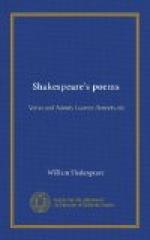
|
| Name: _________________________ | Period: ___________________ |
This test consists of 5 multiple choice questions, 5 short answer questions, and 10 short essay questions.
Multiple Choice Questions
1. What does Venus mean when she says, in lines 649 and 650, "For where love reigns, disturbing jealousy/ Doth call himself affection’s sentinel"?
(a) When a person is in love, jealousy sounds frequent alarms.
(b) Love is stronger than jealousy and can preserve affection against it.
(c) When a person is ruled by love, other relationships suffer.
(d) Love upsets jealousy because it considers affection more important.
2. What technique is used in lines 629 and 630, "The thorny brambles and embracing bushes/ As fearful of him, part"?
(a) Symbolism.
(b) Personification.
(c) Allusion.
(d) Metaphor.
3. What does Venus refer to as "ugly, meagre, lean"?
(a) Love.
(b) Death.
(c) Life.
(d) Lust.
4. What technique is used in line 720, "'In night,' quoth she, 'desire sees best of all.'"?
(a) Hyperbole.
(b) Epigram.
(c) Allusion.
(d) Apostrophe.
5. What is the most logical definition of "tushes" in the context of line 617, "Whose tushes never sheath’d he whetteth still"?
(a) Tusks.
(b) Touches.
(c) Hooves.
(d) Knives.
Short Answer Questions
1. What does Venus tell Adonis is usually unlike her?
2. In line 1043, what is the speaker comparing to "a king perplexed in his throne"?
3. What is the best definition of "sepulchres" in line 622, "His snout digs sepulchres where’er he goes"?
4. Who is the "flap-mouth’d mourner" referred to in line 920?
5. How does Venus know that the dogs are barking at a boar, bear, or lion?
Short Essay Questions
1. What conclusion does Venus reach about why the boar killed Adonis, and what does this cause her to reflect about her own behavior?
2. Why does Venus say that nature should be convicted of treason, and what is Cynthia's plan to thwart what nature has done?
3. How does Adonis contrast love and lust?
4. What does Venus tell Adonis about his beauty and the boar?
5. What trick do Venus's eyes play on her after she has been looking at Adonis's body for a few minutes?
6. What does Venus say about death when she thinks that Adonis has died?
7. What does Venus suggest Adonis do if he insists on hunting on the following day?
8. After Adonis's death, what does Venus predict about love?
9. How does the construction of line 832, "Passion on passion deeply is redoubled," mimic the sense of what is happening in this passage?
10. What is conveyed by the personification and the simile in the passage where Venus runs through the brush toward the sounds of Adonis's hunting party?
|
This section contains 935 words (approx. 4 pages at 300 words per page) |

|




